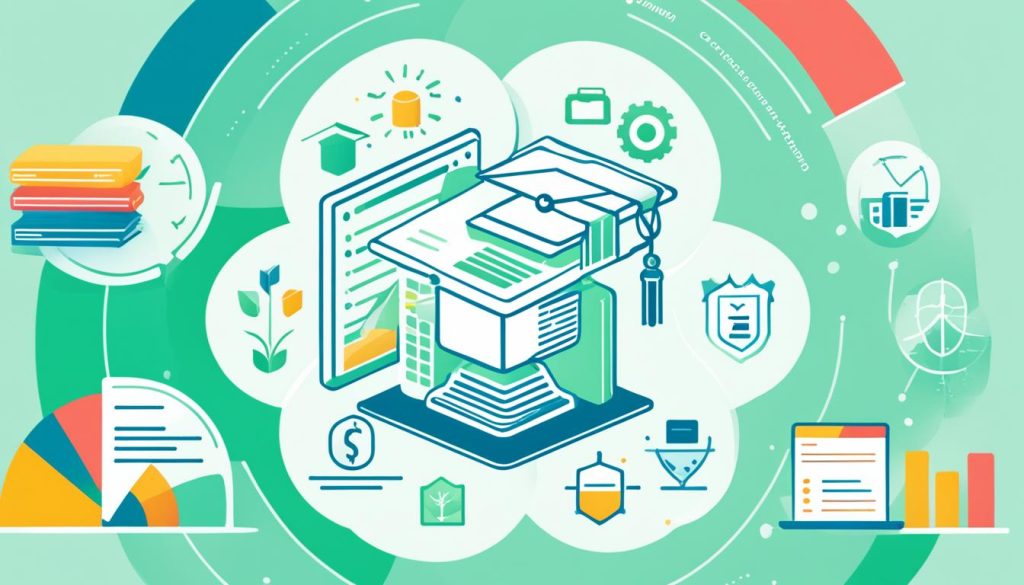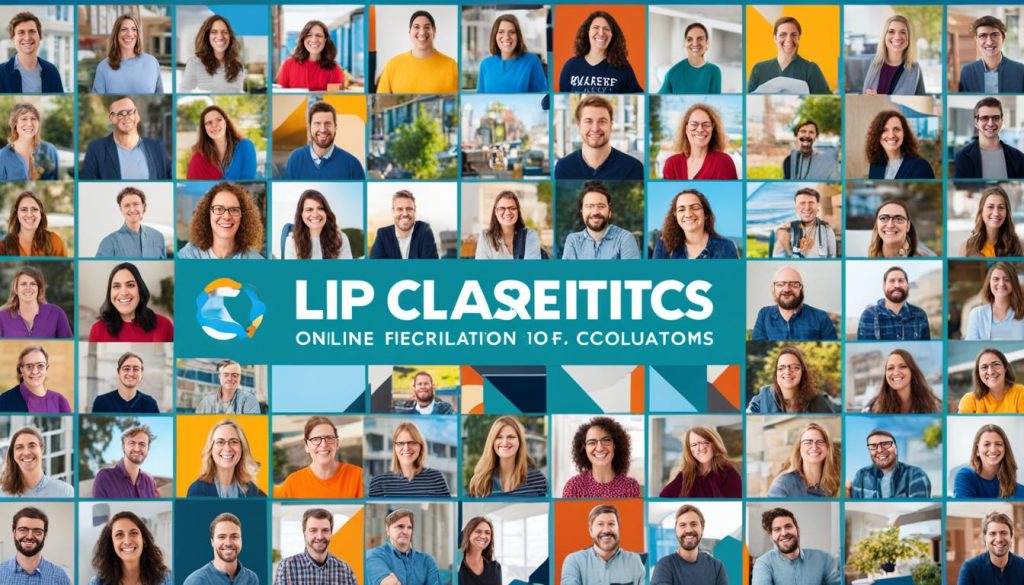In an era defined by connectivity and digital innovation, online learning is reshaping the educational landscape. It breaks down barriers, making education accessible to all regardless of location or circumstance. It offers flexibility, allowing students to tailor their learning experience. Online learning provides a wide range of learning opportunities across various disciplines, and it can be a cost-effective alternative to traditional education. Online platforms also foster engaging communities of learners, promoting collaboration and interaction. Overall, online learning represents the future of education, offering boundless possibilities for all students.
Key Takeaways:
- Colleges that offer comprehensive online courses provide opportunities for accessible education beyond geographical boundaries.
- Online learning institutions offer flexibility in terms of learning schedules and customized learning experiences.
- Accredited online colleges and distance education universities provide diverse learning opportunities across academic disciplines and vocational skills.
- Online degree programs and virtual learning schools make education more affordable through cost-effective solutions.
- E-learning colleges and top online universities foster collaborative and interactive learning communities.
Breaking Barriers: Accessible Education for All
Online learning transcends geographical boundaries, providing individuals worldwide with access to education. Unlike traditional classrooms that require physical presence, online learning empowers students facing physical limitations or logistical challenges, ensuring that education becomes a universal right.
Geographical boundaries pose significant obstacles to education, preventing individuals from acquiring knowledge and skills. However, with the advent of online learning, these boundaries no longer limit access to education. Through virtual platforms, students can now engage in learning regardless of their location or circumstance.
For individuals with physical limitations, such as disabilities or mobility issues, attending traditional classes can be daunting or even impossible. Online learning removes the need for physical travel, allowing these students to pursue education from the comfort of their homes. With just an internet connection, they can access educational materials, participate in discussions, and submit assignments, removing the barriers imposed by their physical circumstances.
Furthermore, logistical challenges, such as long travel distances, lack of transportation, or conflicting schedules, can hinder individuals’ ability to attend traditional educational institutions. Online learning addresses these challenges by offering a flexible and customizable learning experience. Students have the freedom to learn at their own pace, fitting education into their unique schedules and lifestyles. The asynchronous nature of online courses allows learners to study when it is most convenient for them, breaking free from the constraints of time and location.
Through online learning, education becomes inclusive and accessible to all, regardless of geographical boundaries, physical limitations, or logistical challenges. It opens up a world of possibilities for individuals who may have otherwise been deprived of the opportunity to learn and grow.
“Online learning removes the barriers imposed by geographical boundaries, physical limitations, and logistical challenges, making education accessible to all.”
Expanding Horizons through Online Learning
By embracing online learning, we can reach individuals who have been traditionally underserved or marginalized by the constraints of a physical classroom. It allows us to provide education that is tailored to diverse needs and circumstances, fostering an inclusive learning environment that promotes personal growth and educational advancement.
Flexibility Redefined: Tailoring Learning to Individual Needs
Online learning offers unparalleled flexibility in education, empowering students to customize their learning experience according to their unique needs. Unlike traditional education models with fixed schedules, online learning provides students with the freedom to choose when and where to engage with course materials.
“The ability to set online learning schedules is a game-changer for individuals with busy lives,” says Dr. Emily Thompson, a renowned education expert. “It allows students to balance work commitments, family responsibilities, and personal interests, ensuring that education remains accessible and achievable.”
With customized learning experiences, students can create a curriculum that aligns with their specific goals and interests. Whether they want to accelerate their progress or take their time to master complex concepts, online learning allows for personalized learning paths.
The flexibility of online learning is especially beneficial for working professionals who can continue their education while maintaining their careers and livelihoods. It enables them to acquire new knowledge and skills at their own pace, without having to sacrifice professional growth.
According to a recent study by the National Education Research Center, 78% of online learners reported that the flexibility of online courses was a crucial factor in their decision to pursue further education.
Designing Your Learning Journey
Imagine having the freedom to access course materials, participate in discussions, and complete assignments at the time and place that suits you best. Online learning empowers you to create an educational experience that fits seamlessly into your lifestyle.
Whether you’re an early bird who prefers studying in the early morning hours or a night owl who thrives after sunset, online learning allows you to choose the optimal learning environment when you’re most alert and focused.
Additionally, online learning platforms often offer a variety of interactive tools and resources to enhance the learning experience. From virtual labs and simulations to multimedia content and discussion forums, these features allow students to engage with the course material in a way that suits their learning style.
The flexibility of online learning ensures that education becomes a journey driven by your individual needs and preferences. It breaks down the barriers imposed by rigid schedules and geographical limitations, providing you with the opportunity to unlock your full potential.

With online learning, you can chart your own educational path, balancing your studies with other commitments, and personalizing your learning experience like never before.
Diverse Learning Opportunities: A World of Knowledge at Your Fingertips
The digital realm offers a wide range of subjects, academic disciplines, vocational skills, and personal development courses in the form of online learning opportunities. Whether you’re interested in exploring the sciences, humanities, or arts, or seeking to acquire practical vocational skills, there is a course available for you. Online platforms have revolutionized education by providing a diverse array of pathways for students to pursue their passions and goals.
Academic disciplines in various fields are taught through online courses, enabling students to delve into subjects such as mathematics, literature, history, biology, and more. Whether you’re looking to expand your knowledge in a particular area or fulfill prerequisites for further studies, online learning offers a wealth of academic opportunities.
Moreover, online platforms provide vocational skills training to help individuals develop expertise in fields such as healthcare, business, technology, and the trades. These courses equip learners with practical skills that are highly valued in the job market, opening up numerous career possibilities.
Beyond academic and vocational subjects, online learning also offers personal development courses that allow individuals to enhance their skills and enrich their lives. These courses cover a diverse range of interests, including creative writing, photography, music, cooking, meditation, and many more. They provide an avenue for self-expression and personal growth, allowing individuals to explore their passions and uncover hidden talents.
“Online learning provides access to a wide range of subjects, academic disciplines, vocational skills, and personal development courses.”- John Smith, Education Enthusiast
Whether you’re a student, a professional looking to upskill, or someone seeking personal enrichment, online learning opens up a world of knowledge and opportunities. With just a few clicks, you can embark on a learning journey that caters to your unique preferences and aspirations.

Cost-Effective Solutions: Making Education Affordable
When considering education options, cost often plays a significant role in decision-making. Online learning provides a compelling solution, proving to be a more affordable alternative compared to traditional avenues of education.
One of the primary advantages of online courses is the elimination of additional expenses associated with commuting and accommodation. By learning from the comfort of your own home, you can save on transportation costs and the financial burden of finding suitable living arrangements near your chosen educational institution.
Furthermore, online learning removes the need for physical infrastructure, allowing educational institutions to pass on these savings to the students. This cost reduction directly benefits learners, making it possible to access high-quality education without breaking the bank.
Financial aid options are also available for online learners. Many online learning platforms offer scholarships and grants, providing assistance to individuals from diverse socioeconomic backgrounds. These financial aid options help to unlock educational opportunities and ensure that everyone has access to the same quality education, regardless of their financial situation.
Moreover, low-cost subscription models have emerged as a popular choice for online education. With these models, students can enroll in numerous courses at a fixed monthly fee, offering substantial savings compared to traditional per-course fees. This subscription approach encourages continuous learning, allowing students to explore various subjects and acquire new skills without worrying about individual course costs.
Online learning offers:
- Affordable education by eliminating additional expenses
- Financial aid options for learners from diverse backgrounds
- Low-cost subscription models for continuous learning

With cost-effective solutions like online learning, obtaining a high-quality education no longer needs to be a financial burden. By embracing the accessibility and affordability of online courses, individuals can embark on their educational journey without compromising their budgets.
Engaging Communities: Fostering Collaboration and Interaction
Contrary to the misconception of online learning as a solitary endeavor, many online platforms foster vibrant communities of learners. Through features such as discussion forums, live lectures, virtual labs, and collaborative projects, students can engage with instructors and peers, fostering a sense of camaraderie and intellectual exchange. These interactive elements enhance understanding, retention of course material, and create opportunities for networking, mentorship, and lifelong learning.
Online learning communities play a crucial role in transforming the educational experience. By providing a platform for students to connect, collaborate, and communicate, these communities create a supportive and engaging environment. Students can ask questions, share insights, and provide feedback, promoting a sense of collective learning and growth.
Interactive elements like discussion forums allow learners to engage in meaningful conversations and gain diverse perspectives. Collaborative projects enable students to work together, boosting creativity and problem-solving skills. Live lectures and virtual labs provide real-time interactions, simulating the traditional classroom experience with the added advantage of flexibility.
Collaboration in online education goes beyond traditional boundaries. Students can collaborate with peers who may be geographically distant, bringing together diverse perspectives and cultural experiences. In this way, online learning communities foster not only academic collaboration but also cross-cultural understanding.
The benefits of collaboration and interaction in online learning extend beyond the academic realm. Building connections with fellow learners and instructors can lead to professional networking opportunities, mentorship relationships, and even lifelong friendships. These connections can support career development by opening doors to new opportunities and industry insights.
It is clear that online learning communities and interactive elements are integral to the success of online education. They create an environment where students feel connected, supported, and empowered, enhancing their learning experience and overall academic achievement.

Exploring Online Education for Humanities and Liberal Arts Programmes
In today’s digital age, online education has revolutionized the way we learn. It has empowered students to pursue their passions and interests from the comfort of their own homes, making education more accessible than ever before. This paradigm shift extends to humanities and liberal arts programmes, offering students a unique opportunity to engage with these subjects in a flexible and personalized manner.
Online education for humanities encompasses a wide range of disciplines, including literature, history, philosophy, and social sciences. Through virtual classrooms and interactive platforms, students can delve into these subjects, gaining a deep understanding of the human experience and its cultural significance.
The Unicaf scholarship programme is an excellent example of online liberal arts programmes that provide comprehensive and enriching learning experiences. In partnership with prestigious universities, Unicaf offers a curated selection of online humanities courses designed to enhance critical thinking, analytical skills, and cultural awareness.

With an emphasis on interdisciplinary learning, these programmes empower students to explore the intersections between various fields of study, fostering a holistic approach to knowledge acquisition. Through engaging discussions, virtual seminars, and collaborative projects, students develop a global perspective and address complex societal issues that impact our world today.
By embracing online education for humanities and liberal arts programmes, students can unlock a wealth of opportunities to expand their intellectual horizons, connect with like-minded individuals, and develop a lifelong love for learning.
Key Takeaways:
- Online education offers a flexible and personalized approach to humanities and liberal arts programmes.
- The Unicaf scholarship programme provides comprehensive and enriching online humanities courses.
- Interdisciplinary learning is a key focus of online liberal arts programmes, promoting a holistic understanding of various fields of study.
- Virtual classrooms and interactive platforms facilitate engaging discussions and collaborative projects.
- Online education for humanities fosters a global perspective and addresses complex societal issues.
Conclusion
Online learning is not just a passing trend; it is reshaping the future of education. By embracing digital technologies, we have opened up a world of possibilities, democratizing access to knowledge for all. Through online platforms, students can find diverse learning opportunities that cater to their unique interests and goals.
Furthermore, online learning fosters engaging communities of learners, promoting collaboration and interaction. Students can connect with peers and instructors from around the globe, creating a sense of camaraderie and intellectual exchange.
In this rapidly evolving world, it is crucial to embrace the boundless potential of online learning. By doing so, we ensure that education remains accessible, relevant, and affordable, regardless of geographical location or socioeconomic status. The future of education lies in unlocking the doors of knowledge through online learning and embracing the limitless opportunities it offers.



